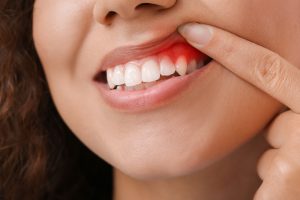Understanding the Dangers of Poor Oral Hygiene in Harris, NY
 Taking care of your teeth and gums isn’t just about having a bright, confident smile—it’s about protecting your overall health. Poor oral hygiene can lead to cavities, gum disease, bad breath, and even more severe health issues. Neglecting your dental care routine may seem harmless at first, but over time, it can result in costly treatments and long-term consequences.
Taking care of your teeth and gums isn’t just about having a bright, confident smile—it’s about protecting your overall health. Poor oral hygiene can lead to cavities, gum disease, bad breath, and even more severe health issues. Neglecting your dental care routine may seem harmless at first, but over time, it can result in costly treatments and long-term consequences.
At Cohen Dentistry, the best dentist in Harris, NY, Dr. Ari Cohen can help patients understand the risks of poor oral hygiene and can motivate you to take better care of your teeth, ensuring a healthier future for your smile. If you’re in Harris, Liberty or the surrounding areas, contact Dr. Cohen by calling (845) 794-4545 for professional care and personalized advice.
How Poor Oral Hygiene Affects Your Teeth and Gums
Neglecting your daily dental routine can have serious consequences. Here’s what happens when oral hygiene takes a backseat:
Plaque and Tartar Build-Up
Plaque is a sticky film of bacteria that forms on your teeth throughout the day. If not removed through brushing and flossing, it hardens into tartar, which can only be removed by a dentist. Tartar buildup can lead to tooth decay, gum inflammation, and eventually gum disease.
Cavities and Tooth Decay
When plaque is left untreated, bacteria produce acids that attack tooth enamel. Over time, this leads to cavities—small holes in the teeth that, if untreated, can cause pain, infection, and even tooth loss. Regular dental cleanings with Dr. Cohen can help prevent cavities from worsening.
Gum Disease (Gingivitis & Periodontitis)
Gingivitis, the earliest stage of gum disease, causes redness, swelling, and bleeding gums. If left untreated, it progresses to periodontitis, a severe infection that can damage gum tissue and bone structure. Advanced gum disease may even lead to tooth loss. Fortunately, early detection and treatment can prevent permanent damage.
Bad Breath (Halitosis)
Poor oral hygiene often results in chronic bad breath. Food particles and bacteria trapped between teeth and on the tongue create an unpleasant odor. Regular brushing, flossing, and dental visits can eliminate these issues and keep your breath fresh.
Tooth Sensitivity
As tooth enamel wears away due to plaque buildup or decay, your teeth may become more sensitive to hot, cold, and sugary foods. This discomfort can interfere with your daily life and indicate underlying dental problems that require professional care.
The Connection Between Oral Health and Overall Health
Your mouth is the gateway to your body, and poor oral health can contribute to systemic health problems. Here’s how:
Increased Risk of Heart Disease
Gum disease has been linked to an increased risk of heart disease. Bacteria from infected gums can enter the bloodstream, leading to inflammation that affects the heart and blood vessels. Maintaining good oral hygiene reduces this risk.
Diabetes Complications
People with diabetes are more prone to gum disease due to higher blood sugar levels, which help bacteria thrive. Conversely, severe gum infections can make it harder to control blood sugar, creating a dangerous cycle. If you have diabetes, prioritizing oral care is essential.
Respiratory Infections
Bacteria from an unhealthy mouth can travel into the lungs, increasing the risk of respiratory infections like pneumonia. This is especially concerning for older adults and individuals with compromised immune systems.
Pregnancy Complications
Poor oral hygiene has been linked to premature birth and low birth weight. Pregnant women should be especially diligent about their dental care to protect their health and the health of their baby.
Signs You May Have Poor Oral Hygiene
 If you experience any of the following symptoms, it may be time to improve your oral care routine or schedule a visit with Dr. Cohen:
If you experience any of the following symptoms, it may be time to improve your oral care routine or schedule a visit with Dr. Cohen:
- Persistent bad breath
- Bleeding gums when brushing or flossing
- Tooth pain or sensitivity
- A dry mouth sensation
- Red, swollen, or receding gums
- White or dark spots on teeth (signs of decay)
Ignoring these symptoms can lead to more severe problems down the road, so early intervention is key.
How to Improve Your Oral Hygiene Routine
A healthy smile starts with simple, daily habits. Follow these steps to maintain excellent oral hygiene and prevent dental issues.
Brush Properly Twice a Day
Use a fluoride toothpaste and brush your teeth for two minutes, covering all surfaces. Replace your toothbrush every three to four months or sooner if the bristles become worn.
Floss Daily
Flossing removes food particles and plaque from between your teeth where your toothbrush can’t reach. Make it a habit to floss once a day to prevent gum disease and cavities.
Use Mouthwash
An antibacterial mouthwash helps kill bacteria, freshens breath, and reduces plaque buildup. Choose a fluoride-based rinse for added cavity protection.
Eat a Tooth-Friendly Diet
Limit sugary and acidic foods, as they contribute to tooth decay. Instead, opt for crunchy fruits and vegetables, dairy products, and foods rich in calcium and phosphorus to strengthen your teeth.
Stay Hydrated
Drinking water helps wash away food particles and bacteria, preventing dry mouth and reducing the risk of decay. Fluoridated water also strengthens enamel.
Visit Cohen Dentistry Regularly
Routine checkups and professional cleanings are essential for maintaining healthy teeth and gums. If you’re in Harris, Monticello or the surrounding areas, schedule an appointment with Dr. Cohen at Cohen Dentistry for quality care.
Common Myths About Oral Hygiene
There are plenty of misconceptions about dental care. Let’s clear up a few myths:
Brushing Harder Cleans Better
Brushing too hard can wear down enamel and damage gums. Use a soft-bristled toothbrush and gentle strokes to clean your teeth effectively.
If Your Gums Bleed, Stop Flossing
Bleeding gums often indicate gum inflammation due to plaque buildup. Instead of stopping, continue flossing gently, and the bleeding should subside with improved oral care.
Mouthwash Can Replace Brushing and Flossing
While mouthwash is helpful, it doesn’t remove plaque or food debris like brushing and flossing do. It should be used as a supplement, not a replacement.
Cavities Only Happen to Kids
Adults are just as susceptible to cavities, especially if they consume sugary foods, neglect oral care, or have dry mouth due to medications. Regular checkups help detect and prevent decay at any age.
Frequently Asked Questions
There’s evidence to suggest that poor oral hygiene and gum disease may contribute to an increased risk of heart disease. The bacteria that cause gum disease can enter the bloodstream and cause inflammation in the heart and blood vessels. Maintaining good oral hygiene may help reduce the risk of heart disease.
Yes, poor oral hygiene can affect your overall health. Oral bacteria can enter the bloodstream through gum tissues, potentially causing inflammation and infections in other parts of the body. Research has linked poor oral health to various health issues, such as heart disease, stroke, diabetes, respiratory problems, and pregnancy complications.
Yes, brushing and flossing regularly can help improve your oral health by removing plaque and preventing tooth decay and gum disease. However, we also recommend visiting your dentist twice a year for dental checkups and cleanings to ensure your oral health is in good condition.
Invest in Your Oral Health Today at Cohen Dentistry
Your smile is one of your greatest assets, and maintaining good oral hygiene is essential for your overall well-being. By following a consistent dental care routine and seeking professional treatment when needed, you can prevent cavities, gum disease, and more serious health issues.
If you’re in Harris, Monticello, Bethel or the surrounding areas, Dr. Ari Cohen at Cohen Dentistry offers excellent dental care to help you maintain a healthy, radiant smile. Don’t wait for problems to arise—schedule your dental checkup with your Harris, NY general dentist today by calling (845) 794-4545 to take the first step toward better oral health.
